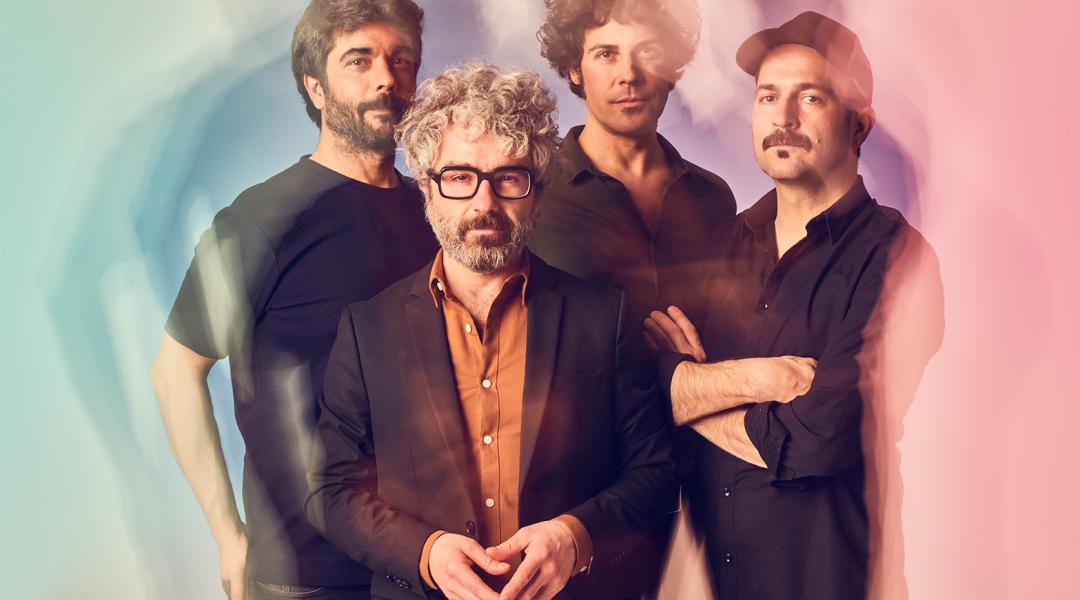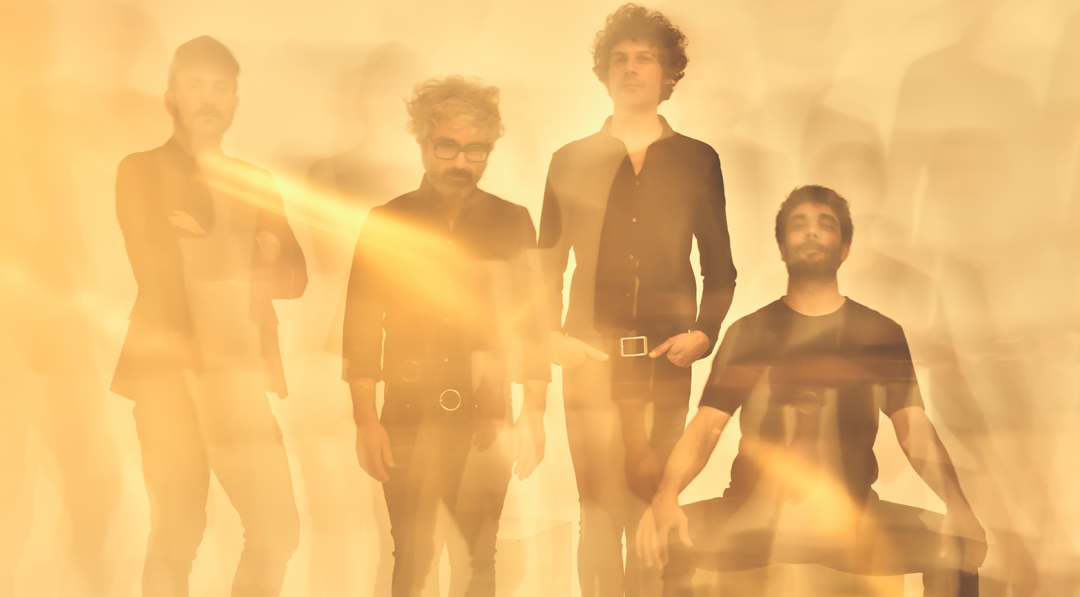León Benavente
The Four Riders of Spanish Pop

The fourpiece has just released a third long-feature album, ‘Vamos a volvernos locos’ (Warner, 2019), their most energetic work to date but not without emotion. It’s a collection of songs that will make you dance on the dancefloor in between sobs.
As the proverb goes, we never know what is awaiting us around the corner. Broadly speaking, this is what happened to Abraham Boba (vocals), Edu Baos (bass and synth), Luis Rodríguez (guitar) and César Verdú (drums) the day their paths crossed in 2012. The reason for that chance encounter –as Leautréamont would say— was a Nacho Vegas tour: the Asturian singer had recruited them as a live band. But some of them had previously played together without being aware of it. “The first time I saw Abraham I was playing with Tachenko [his former band] at the Primavera Sound. Suddenly and without anyone having told me, he climbed onto the stage to play a song with us. When he finished, he got off and I didn't see him again until four years later,” Edu recalls with a laugh.
Ever since that tour brought them together, León Benavente hasn’t left the main stage. Their urgent style with kraut overtones, their relentlessly sharp lyrics and an attitude on the stage that grows with the years have turned them, in just half a decade, into an essential Spanish band. Watch out because the lion is roaring again.
What place Vamos a volvernos locos occupies in your discography?
Luis: It may sound clichéd, but I dare to say this is our best album so far. Probably because we’ve been locked in the studio for three months, while our previous albums were recorded in less than a week. I guess that makes for a much more mature and refined album. Richer, in short.
I guess having the support of a major helps.
Abraham: On an artistic level nothing has changed. We’ve been able to work more hours on this album because Edu has his own studio now [El Cariño, in Mozota, Zaragoza].
César: That and the fact that we’ve been playing together for six years, we understand each other better and we make the most of time.
Unlike other albums, this one features some dance hits. Were you looking forward to getting your music out onto the dance floor?
Abraham: We wanted to make an exciting album people could dance to. We already made aggressive-sounding, wild songs in the past. And there they are—they are part of our repertoire, but we wanted to explore other sensations.
The barrier between indie and mainstream music has faded in recent years, allowing less conventional pop bands like you to reach a greater and more eclectic public, don't you think?
César: Ever since the concept of urban tribe disappeared (heavies, punks, rappers..) people are more open and listen to different music genres. Festivalgoers are not bothered anymore by bands like us sharing the bill with bands such as Za! or Izal. Saying: "I’m indie and I only listen to this kind of music” has become obsolete. People now want to be surprised.
In the album’s press release you highlight some verses by poet Anne Carson: “Hardly glancing at one another, the three of them played as one person, in a state of pure discovery”. How do four minds manage to flow together in the rehearsal room?
Abraham: By knowing very well what we don’t want, mainly. When we’re in the studio, we start playing together (don’t get us wrong—it’s not jam sessions). When an idea comes up, we develop it and let it mutate. Then I work on the lyrics, the melody and the final structure, and we work on it again. Sometimes, the end result has nothing to do with the initial idea...
Luis: We all belong to the same generation and met at a similar vital moment. These are key factors for this connection to exist.
"We already made aggressive-sounding, wild songs in the past. We wanted to explore other sensations"
There is something reminiscent of 80s Spanish music in songs such as “Cuatro Monos” and “No hay miedo”. The latter could be an Hidrogenesse cover or a song by Carlos Berlanga.
César: I’d say Berlanga has been an influence since the first album.
Abraham: We all like Hidrogenesse very much and, although they’re not one of our main influences, we’re interested in what they do. The premise for “No hay miedo” was to write a song that could be played in a club. As for the 80s sound, you may be right, but it wasn’t deliberate. We have it inside our brains somehow. And sometimes we realize things we used to hear on the radio when we were eight have slipped into our songs.
Edu: I’d say the album is 80s music revisited. There may be sensations, nuances and sounds from that decade, but it’s all been updated.

On 26 September, the band embarks on a tour around Spain to premiere their new album. © Warner
The first singles off the album, “Como la piedra que flota” and “Amo”, feature two amazing female voices—María Arnal’s and Amaral’s. It’s a pity they don’t sound louder in the album…
Abraham: They sound like they do because we wanted them to be arrangements rather than duets. These are songs we’re going to play live and singing a duet song alone is really depressing. Kendrick Lamar has done this before with artists like Rihanna and Bono, who just sang a couple of verses. It’s a different but necessary way to collaborate with other artists that allows us to include the songs in our setlists.
The humour in the lyrics on this album is generally positive, but, as it usually happens in all your albums, there’re also verses that convey certain vulnerability and general discontent. Does sending a message play an important role in León Benavente’s songs?
Abraham: The same role as the instrumental part of the song.
Edu: I think what sets us apart from other bands is the importance we give to lyrics. It’s more likely a lyric will leave a mark if it’s good. It makes you think and feel identified with it. This is one of Abraham’s virtues. He can write for everyone drawing on his own experience.
Abraham: It's a vital album with a pinch of humour. In “Cuatro monos” we laugh at ourselves and “Ayer salí” is also a lot of fun. They talk about things that aren’t always pleasant, but we try to laugh at it. I've always liked lyricists who talk about fucked-up experiences with a sense of humour. Randy Newman is a great teacher on this subject.
Don’t you think in recent times music tends to banalize lyrics?
Edu: Beyond our own tastes, I think all lyrics are important. They are a reflection of a specific society. Each group feels identified with certain music and certain lyrics, we are not ones to criticize them.
Cesar: It depends on how demanding listeners are. There’re people who are more interested in well-crafted lyrics while others don’t value what the singer is saying that much.
In your case, what comes first, the lyrics or the music?
Abraham: It depends on the song. Some songs are born from an instrumental piece we put lyrics to. And there there’re others like “Habitación 615” that were a text we put music to.
There isn’t much protest in this album compared to your debut one, am I wrong?
Abraham: In the same way that all your actions are political, all lyrics are political. Even if you are telling a love story, you are expressing an idea. If you’re referring to politics as such, it’s true the first album mirrored more the socio-political dissatisfaction we lived back then. Now we’re thinking whether what is failing us is outside or inside, in our own homes.
How do you see the current Spanish pop scene? Are we witnessing a second Golden Age?
Cesar: When international bands started playing less in Spain as a result of the economic crisis, the national scene experienced a boost. Now, in many cases, Spanish headliners are more successful than international ones. Everything is now more professional, including the gig venue circuit.
Abraham: New and different proposals are emerging and with them very interesting mixtures.
Cesar: I feel Spanish music is going to surprise us all in the coming years.
Could it be said we’re less self-conscious compared to other countries like the UK, France or the US?
César: Totally, we’ve overcome the fear of singing in Spanish.
Luis: Just see what Rodrigo Cuevas is doing... There’s also a call effect here. When many young people see their neighbours are doings things and that it’s working for them, the do the same.
Edu: It's like going back to the 80s.
Abraham: Only without drugs! [laughs]



